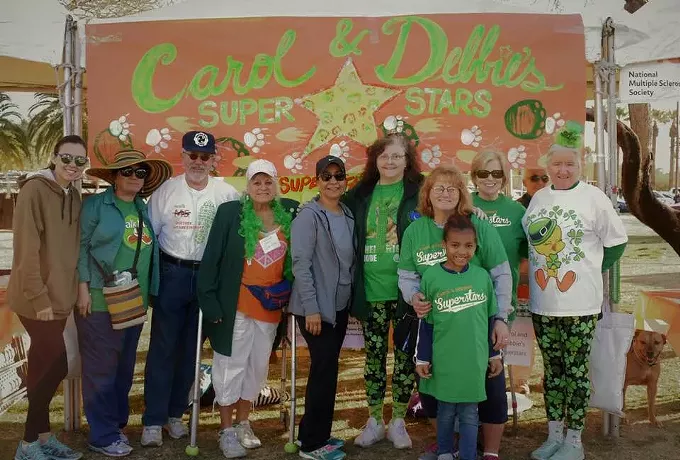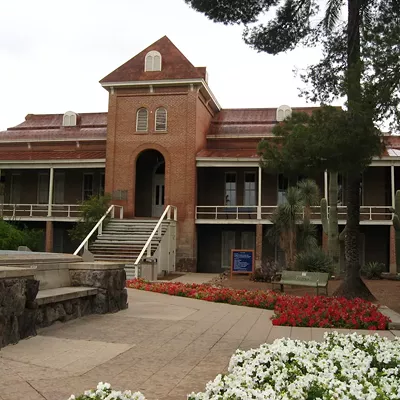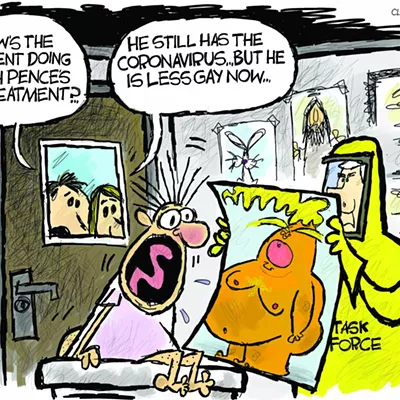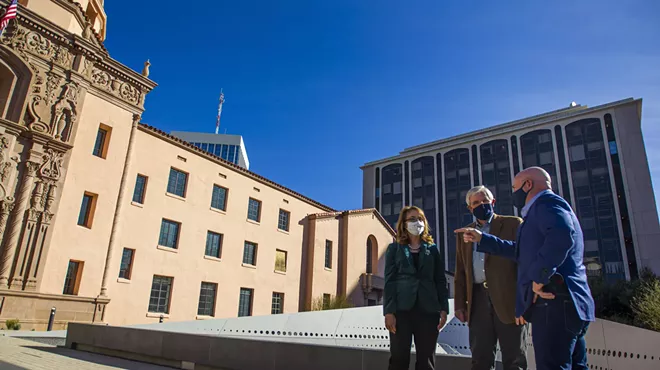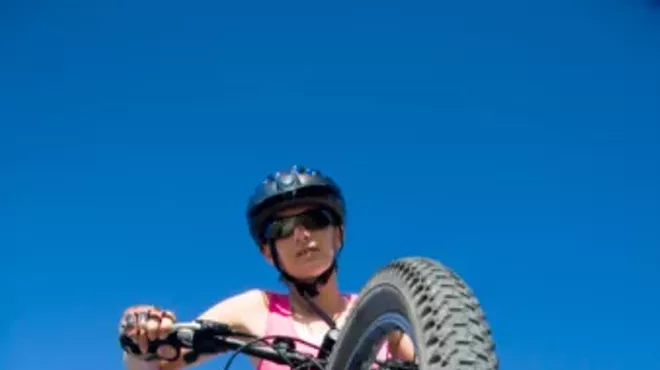Tuesday, February 26, 2019
While MS Treatments Improve, Local Group Walks For Cure
When Carol Hunter was leaving a hockey game 23 years ago she took a spill in the parking lot. She was embarrassed and recalls jumping to her feet, not giving the incident much thought. Days prior, she was in a fender-bender and was probably suffering from a minor case of whiplash. A few months later, Hunter woke up and her whole body was numb.
At 40, Hunter was diagnosed with multiple sclerosis.
Hunter admits she was a “closet MS-er” at first. But when she began having trouble walking in 2003, she was forthright about her condition. She gave up driving for three years starting in 2007, due to lack of reliable mobility in her right leg. By 2010, Hunter was fed-up with being grounded, so she opted to get hand-controls on her vehicle.
“Because that’s a big thing—not losing your independence,” Hunter said.
Although Hunter isn’t currently taking any disease-modifying therapy medications—which are designed to delay the condition from progressing and mitigate inflammation—she is treating some of her symptoms with medicine, which include muscle cramps and stiffness.
She said there are two pivotal d-words that impact people with MS: denial and depression.
She knows that isolation can negatively impact her health, so besides staying connected with other people affect by the disease, Hunter will be participating in the annual MS Walk Tucson event, which is hosted by the National Multiple Sclerosis Society.
Hunter met Debbie Sheehan at the annual fundraiser about 20 years ago. Sheehan was diagnosed while on active duty with the Air National Guard during Operation Desert Storm in 1991.
In 2010, they formed a walking team for Tucson’s local fundraising event and dubbed the group Carol and Debbie’s Superstars. Last year they were named the No. 1 team at the local event, raising $8,000. Overall, the Tucson walk collected $76,000 and have set this year’s goal at $90,000.
Throughout the U.S., the walk brought in $38 million in 2018 and the non-profit’s cumulative fundraising effort surpassed $1 billion in 2017.
About 83 percent of the funds raised during the national walk goes toward research, various programs and education according to National Multiple Sclerosis Society statistics.
Treatments expanding
MS is an autoimmune disease that triggers a person’s immune system to attack the central nervous system. The attacks, often referred to as relapses, either impede or stop messages within the brain, spinal cord and optic nerves from traveling to the body.
There is no known cause for the disease and there is no cure. What the medical community knows is many people who live with MS typically share some common risk factors.
Geography is thought to play a role, and most people who contract the disease spent their formative years living in regions North of the equator. Thus, the disease largely impacts Caucasians and people of Northern European descent. According to the national MS society, growing evidence suggests a lack of vitamin D in the blood puts people at high risk for developing MS.
Scientific studies are being conducted on certain viruses and bacteria, such as measles and Epstein-Barr virus, to determine whether they play a role in MS.
People living with MS may experience a variety of symptoms that range among vision impairment, loss of motor skills or cognition, fatigue, numbness of the face and body, mood swings and depression.
There are four different types of MS that are characterized by how the symptoms progress, which include: relapsing-remitting; secondary-progressive; primary-progressive; and progressive-relapsing.
According to a recent study supported by the national MS society, nearly 1 million people are living with disease in the United States. That’s more than twice as many people originally estimated to have the condition.
People typically develop MS between the ages of 20 and 50, and women are twice as likely to succumb to the disease.
Many young people aren’t diagnosed with MS right away, Hunter explained, because either they’re especially busy or the symptoms are manageable and last a short amount of time.
“By the time you go to the doctor nothing is happening, so why are you going to take the time to check into it,” Hunter said.
Moreover, many young adults avoid getting checked out for MS symptoms, which plays into those in denial about the condition, Sheehan added. When Sheehan was diagnosed more than 30 years ago, she said at the time it felt like a death sentence.
Today, Sheehan says things are different. She’s learned that people, whether it’s a stranger at the grocer or a friend, are very willing to help. Another way to cope with the disease is to have a sense of humor, she said.
“You learn, as the disease goes on, to laugh at yourself,” Sheehan said. “You don’t know from day to day what’s going to happen, but you don’t worry about it because it can consume you.”
Sheehan says her faith, unyielding family support and an effective medical team keeps her upbeat and full of life. “Every day is different, but every day’s a gift.”
The first three medicines made to treat MS were made available during the first half the 1990s. They’re known as the “A-B-C” drugs because of their brand names.
Today, there are 15 disease-modifying therapies available, including Ocrevus, which marks the first treatment designed to combat primary progressive MS. Patients affected by this form of the disease experience a continual increase in brain damage with no bouts of remission. This population makes up about 15 percent of all MS patients.
Hunter said when oral medications were introduced to the market about a decade ago, people with MS became more compliant with their health plan. What’s more, injection-based medicines can damage the skin, so patients are encouraged to rotate the part of the body they apply the drug, she explained.
Although the topic is controversial, MS patients are now utilizing medical marijuana and cannabis to cope with pain and muscle spasms brought on by the disease.
By and large, healthcare professionals recommend a comprehensive approach to tackling MS, where a patient manages their symptoms, attends physical therapy and incorporates exercise as well as attends to their mental health.
In an effort to maintain and offer emotional support, Hunter and Cindy Lewis stay committed to the Northwest Tucson MS Support Group. Lewis, who was diagnosed with MS in 1989, began to facilitate the monthly meeting with Hunter a few years ago.
Lewis said she’s excited about the breakthroughs in medications being offered to MS patients today. And she’s seriously considering whether to try the new cutting edge treatments for primary progressive MS.
Lewis said most of the innovations in medicines for MS seem to be discovered by accident. She’s also noticed a change among pharmaceutical developers.
“For so many years corporations were very proprietary in their research,” Lewis said. “But I think something has happened and companies are recognizing it’s not just about business and patients are expecting solutions.”
Local company prompts forward thinking
Amongst all the unknowns related to this disease, one local company is offering another tool to improve MS treatment.
MSDx Inc., which was founded in 2010, is a neuro-diagnostic company that designs blood testing products for pharmaceutical developers and researchers working in the field of neurodegenerative diseases.
The company’s “Window into the Brain” technology offers a real-time view of neurodegenerative disease activity by analyzing damaged cells that have recirculated into a patient’s blood.
Instead of requiring expensive equipment or an invasive procedure, their goal is to offer a simple blood test to determine whether a patient’s disease-modifying therapy is working, said Marie Wesselhoft, president and cofounder of MSDx Inc.
While blood work and genetics have ushered in progress for fighting infectious disease or cancer, neurodegenerative research is a nascent segment of the healthcare industry, Wesselhoft said.
Furthermore, she said potentially providing a more targeted treatment for MS in the future fits the Precision Medicine Initiative, a healthcare research plan launched by President Obama in 2015. This national research effort aims to understand how a person’s genetics, environment and lifestyle can determine the best ways to prevent and mitigate disease, according to the National Library of Medicine. The plan’s long-term goal is to recruit 1 million volunteers to make up a national “biobank” of genetic data, biological samples and other health related information to help create personalized healthcare treatments.
At the time, the Obama Administration said while most medical treatments have been designed for the “average patient” this “one-size-fits-all” approach doesn’t serve everyone.
During the last eight years, MSDx Inc. has tested more than 2,500 patient samples from four different neurodegenerative diseases including MS, Parkinson's disease, Alzheimer's disease and mild traumatic brain injury, or concussion. Along the way they’ve partnered with multiple companies and medical schools including the University of Arizona College of Medicine.
Even though their company deals directly with researchers, participating in events like MS Walk Tucson provides invaluable insight into what it’s like for people on the frontline, Wesselhoft said.
“Anytime we have the ability to learn more about the patient — it’s a privilege,” she said.
And MSDx has again decided to sponsor Carol and Debbie’s Superstars at this year’s fundraiser.
“They’ve been fabulous,” Wesselhoft said. “And I happen to be on their fan club, because they’re so proactive.”
At 40, Hunter was diagnosed with multiple sclerosis.
Hunter admits she was a “closet MS-er” at first. But when she began having trouble walking in 2003, she was forthright about her condition. She gave up driving for three years starting in 2007, due to lack of reliable mobility in her right leg. By 2010, Hunter was fed-up with being grounded, so she opted to get hand-controls on her vehicle.
“Because that’s a big thing—not losing your independence,” Hunter said.
Although Hunter isn’t currently taking any disease-modifying therapy medications—which are designed to delay the condition from progressing and mitigate inflammation—she is treating some of her symptoms with medicine, which include muscle cramps and stiffness.
She said there are two pivotal d-words that impact people with MS: denial and depression.
She knows that isolation can negatively impact her health, so besides staying connected with other people affect by the disease, Hunter will be participating in the annual MS Walk Tucson event, which is hosted by the National Multiple Sclerosis Society.
Hunter met Debbie Sheehan at the annual fundraiser about 20 years ago. Sheehan was diagnosed while on active duty with the Air National Guard during Operation Desert Storm in 1991.
In 2010, they formed a walking team for Tucson’s local fundraising event and dubbed the group Carol and Debbie’s Superstars. Last year they were named the No. 1 team at the local event, raising $8,000. Overall, the Tucson walk collected $76,000 and have set this year’s goal at $90,000.
Throughout the U.S., the walk brought in $38 million in 2018 and the non-profit’s cumulative fundraising effort surpassed $1 billion in 2017.
About 83 percent of the funds raised during the national walk goes toward research, various programs and education according to National Multiple Sclerosis Society statistics.
Treatments expanding
MS is an autoimmune disease that triggers a person’s immune system to attack the central nervous system. The attacks, often referred to as relapses, either impede or stop messages within the brain, spinal cord and optic nerves from traveling to the body.
There is no known cause for the disease and there is no cure. What the medical community knows is many people who live with MS typically share some common risk factors.
Geography is thought to play a role, and most people who contract the disease spent their formative years living in regions North of the equator. Thus, the disease largely impacts Caucasians and people of Northern European descent. According to the national MS society, growing evidence suggests a lack of vitamin D in the blood puts people at high risk for developing MS.
Scientific studies are being conducted on certain viruses and bacteria, such as measles and Epstein-Barr virus, to determine whether they play a role in MS.
People living with MS may experience a variety of symptoms that range among vision impairment, loss of motor skills or cognition, fatigue, numbness of the face and body, mood swings and depression.
There are four different types of MS that are characterized by how the symptoms progress, which include: relapsing-remitting; secondary-progressive; primary-progressive; and progressive-relapsing.
According to a recent study supported by the national MS society, nearly 1 million people are living with disease in the United States. That’s more than twice as many people originally estimated to have the condition.
People typically develop MS between the ages of 20 and 50, and women are twice as likely to succumb to the disease.
Many young people aren’t diagnosed with MS right away, Hunter explained, because either they’re especially busy or the symptoms are manageable and last a short amount of time.
“By the time you go to the doctor nothing is happening, so why are you going to take the time to check into it,” Hunter said.
Moreover, many young adults avoid getting checked out for MS symptoms, which plays into those in denial about the condition, Sheehan added. When Sheehan was diagnosed more than 30 years ago, she said at the time it felt like a death sentence.
Today, Sheehan says things are different. She’s learned that people, whether it’s a stranger at the grocer or a friend, are very willing to help. Another way to cope with the disease is to have a sense of humor, she said.
“You learn, as the disease goes on, to laugh at yourself,” Sheehan said. “You don’t know from day to day what’s going to happen, but you don’t worry about it because it can consume you.”
Sheehan says her faith, unyielding family support and an effective medical team keeps her upbeat and full of life. “Every day is different, but every day’s a gift.”
The first three medicines made to treat MS were made available during the first half the 1990s. They’re known as the “A-B-C” drugs because of their brand names.
Today, there are 15 disease-modifying therapies available, including Ocrevus, which marks the first treatment designed to combat primary progressive MS. Patients affected by this form of the disease experience a continual increase in brain damage with no bouts of remission. This population makes up about 15 percent of all MS patients.
Hunter said when oral medications were introduced to the market about a decade ago, people with MS became more compliant with their health plan. What’s more, injection-based medicines can damage the skin, so patients are encouraged to rotate the part of the body they apply the drug, she explained.
Although the topic is controversial, MS patients are now utilizing medical marijuana and cannabis to cope with pain and muscle spasms brought on by the disease.
By and large, healthcare professionals recommend a comprehensive approach to tackling MS, where a patient manages their symptoms, attends physical therapy and incorporates exercise as well as attends to their mental health.
In an effort to maintain and offer emotional support, Hunter and Cindy Lewis stay committed to the Northwest Tucson MS Support Group. Lewis, who was diagnosed with MS in 1989, began to facilitate the monthly meeting with Hunter a few years ago.
Lewis said she’s excited about the breakthroughs in medications being offered to MS patients today. And she’s seriously considering whether to try the new cutting edge treatments for primary progressive MS.
Lewis said most of the innovations in medicines for MS seem to be discovered by accident. She’s also noticed a change among pharmaceutical developers.
“For so many years corporations were very proprietary in their research,” Lewis said. “But I think something has happened and companies are recognizing it’s not just about business and patients are expecting solutions.”
Local company prompts forward thinking
Amongst all the unknowns related to this disease, one local company is offering another tool to improve MS treatment.
MSDx Inc., which was founded in 2010, is a neuro-diagnostic company that designs blood testing products for pharmaceutical developers and researchers working in the field of neurodegenerative diseases.
The company’s “Window into the Brain” technology offers a real-time view of neurodegenerative disease activity by analyzing damaged cells that have recirculated into a patient’s blood.
Instead of requiring expensive equipment or an invasive procedure, their goal is to offer a simple blood test to determine whether a patient’s disease-modifying therapy is working, said Marie Wesselhoft, president and cofounder of MSDx Inc.
While blood work and genetics have ushered in progress for fighting infectious disease or cancer, neurodegenerative research is a nascent segment of the healthcare industry, Wesselhoft said.
Furthermore, she said potentially providing a more targeted treatment for MS in the future fits the Precision Medicine Initiative, a healthcare research plan launched by President Obama in 2015. This national research effort aims to understand how a person’s genetics, environment and lifestyle can determine the best ways to prevent and mitigate disease, according to the National Library of Medicine. The plan’s long-term goal is to recruit 1 million volunteers to make up a national “biobank” of genetic data, biological samples and other health related information to help create personalized healthcare treatments.
At the time, the Obama Administration said while most medical treatments have been designed for the “average patient” this “one-size-fits-all” approach doesn’t serve everyone.
During the last eight years, MSDx Inc. has tested more than 2,500 patient samples from four different neurodegenerative diseases including MS, Parkinson's disease, Alzheimer's disease and mild traumatic brain injury, or concussion. Along the way they’ve partnered with multiple companies and medical schools including the University of Arizona College of Medicine.
Even though their company deals directly with researchers, participating in events like MS Walk Tucson provides invaluable insight into what it’s like for people on the frontline, Wesselhoft said.
“Anytime we have the ability to learn more about the patient — it’s a privilege,” she said.
And MSDx has again decided to sponsor Carol and Debbie’s Superstars at this year’s fundraiser.
“They’ve been fabulous,” Wesselhoft said. “And I happen to be on their fan club, because they’re so proactive.”
MS Walk Tucson
What: Walk MS Tucson
Where: Reid Park
When: Saturday, March 2
Time: Registration: 7:30 a.m. Walk starts: 9 a.m.
Website: www.nationalmssociety.org
Northwest Tucson MS Support Group
Where: Casas Adobes Congregational Church, 6801 N. Oracle Road
When: Every second Wednesday of the month
Time: 10 a.m. - noon
Contact: Carol Hunter, hunterhi1@comcast.net
Tags: walk for the cure , MS , treatment , research , fundraising , MS Walk Tucson , Image


